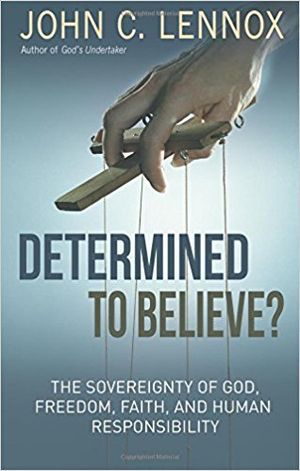Lennox is a professor of mathematics at Oxford University and has become well known in evangelical circles for his books and debates with atheists. One tribute honours him as ‘one of today’s finest evangelical minds’.
Lennox states that his objective in writing is ‘to challenge deterministic arguments that claim to be based on something I do not challenge: the biblical doctrines of the sovereignty of God and human responsibility’ (p.357).
The first chapter puts the discussion of human free will in the context of philosophical concepts. He argues that we have free will and that God has not determined our choices. He is persuaded that both morality and love are dependent on free will.
He confronts ‘theological determinism’, by which he means the Calvinistic view of God’s sovereignty. He uses the term ‘theological determinism’, because he considers it unbiblical to describe anyone as either a Calvinist or an Arminian. However, it should be noted that he is personally gracious towards his Reformed brothers, while bold to name and critique the likes of Luther, Calvin, Edwards, Lloyd-Jones, R. C. Sproul, Grudem, Piper and Carson.
He is appreciative of the Reformed theological heritage and fondly remembers reading Calvin’s sermons in the original French as a student. He comments, ‘It is that sense of indebtedness, together with the awareness of my own inadequacies, that has made me hesitate for a very long time before deciding to write this book’ (p.49).
Lennox does have a high view of Scripture, acknowledges human sinfulness, and rejoices in the doctrine of justification by faith. He affirms that we are saved by grace: ‘God is the initiator and source of salvation that no human can merit’, but he could be described as a four-point Arminian.
He writes: ‘God has provided a salvation that is available to all, and whether a person is saved or not depends on two factors: on God’s part, on the provision of that salvation; and on our side, on our faith, not our merit — on whether or not we will avail ourselves of that salvation, with the capacity for exercising trust that God has given us’ (p.279).
He refers to the familiar acronym TULIP. He rejects Total Depravity. While agreeing that all are sinners who cannot merit salvation, he affirms that we are able to respond to the gospel without the need of the regenerating power of the Holy Spirit. He states that we are not to interpret Scripture ‘in such a way as to undercut human free will’. He continues: ‘God will do everything in his power to help us, but he cannot decide for us’ (p.142). He denies that Romans 5:12 teaches that all humanity stands guilty following Adam’s sin.
He rejects Unconditional Election: ‘We see God’s purpose is to have mercy on all, not just on some chosen subset of people, whose fate is determined without any reference to them, but mercy on all who are willing to respond to his offer’ (p.307). In a brief comment, he also rejects Limited Atonement.
In a rather simplistic manner he dismisses Irresistible Grace when referring to Israel’s unbelief: ‘They are guilty of resisting God’s grace. Hence God’s grace is resistible’ (p.288).
However, he does affirm the Perseverance of the Saints: ‘I hold that God does “preserve the saints”, in the sense that a genuine believer cannot be lost; but … the reason is not found in the notion of unconditional election’ (p.319).
The majority of the book engages in biblical exegesis. Attention is given to John 7-10 and Romans 9-11. A concluding section shows that assurance of salvation can be built on the gospel without affirming unconditional election. Having defended his position philosophically and theologically, Lennox aims to demonstrate that Scripture is best interpreted within this ‘free will’ paradigm.
I was not impressed by his exegetical skills or his conclusions. Although he writes clearly and the book is well structured, his brilliant mind fails to explain or accept the true paradox of God’s sovereignty and human responsibility.
Nathan Pomeroy
Nottingham








